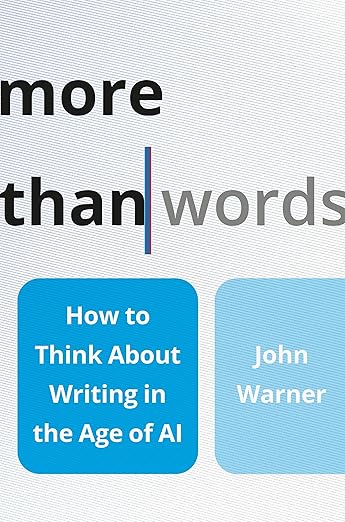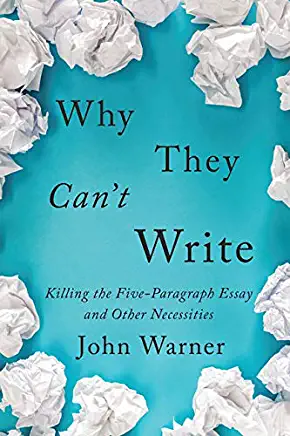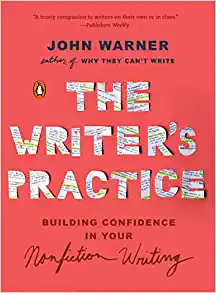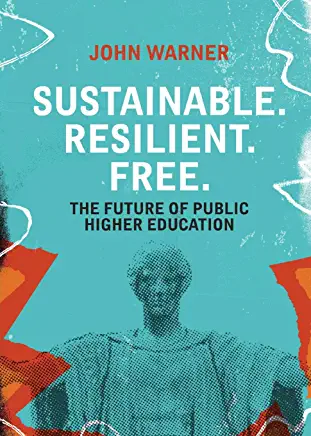Award-winning editor & leading expert on the teaching of writing in the AI age
“[More Than Words: How to Think About Writing in the Age of AI] is a wise and clear-eyed case for why human writing should and will endure in the age of AI.”
—Jane Rosenzweig, Director, Harvard College Writing Center“As a public speaker and educator, John Warner is charming, astute and genuine. During his ‘What Do You Have to Say?’ workshop, he kept attendees rapt as he offered a mix of practical and encouraging advice. The attendees all left his workshop invigorated to write their way into the world and I couldn’t be more thrilled.”
—Roxane Gay, Ph.D., Gloria Steinem Endowed Chair in
Media, Culture, & Feminist Studies, Rutgers University
Thanks to a long career as a writer, editor, and writing teacher, John Warner knows writing and sees the existence of generative AI applications like ChatGPT not as a threat, but as an opportunity to break students out of the slumber of “schooling” and instead empower them to develop enduring writing “practices.”
His new book, More Than Words: How to Think About Writing in the Age of AI is a guide to making sure we preserve what’s essential and enduring about reading and writing no matter how advanced technology becomes. Writing is not the same thing as syntax generation, and Warner can show any audience how to get engaged with writing, so technology becomes a tool for human use, rather than a substitute for human work.
Warner’s perspective and expertise was forged through over 20 years of experience teaching writing at four different institutions (University of Illinois, Virginia Tech, Clemson, College of Charleston).
Warner has written and edited everything from market research focus group reports to award-winning humor with McSweeney’s Internet Tendency, to a novel, to short stories, to essays, to interviews, articles, blog posts, and a #1 bestseller done primarily in colored pencil, My First Presidentiary: A Scrapbook of George W. Bush (Crown, co-authored with Kevin Guilfoile).
Warner’s book, Why They Can’t Write: Killing the Five-Paragraph Essay and Other Necessities (Johns Hopkins UP), cracked open the conversation on the negative effects of writing instruction oriented around high stakes standardized tests, and argues for a more comprehensive view of student writing, and how that work is resourced inside of schools.
The Writer’s Practice: Building Confidence in Your Nonfiction Writing (Penguin), is an innovative approach to organizing a writing classroom and course through the use of writing “experiences” that disincentivize outsourcing writing to a syntax generator by engaging student interests and inherent human curiosity. The approach is used successfully in thousands of classrooms across the country from students as young as 5th grade, to as old as graduate students.
John Warner keeps up an active writing practice of his own. In addition to his books for more than a dozen years he has been blogging weekly at Inside Higher Ed, and has also been a weekly columnist for the Chicago Tribune, writing about books and the habits of reading as his alter ego, “The Biblioracle.” In 2021 he started an associated Substack newsletter, The Biblioracle Recommends, which was a Substack Featured Publication for 2021.
A native of Chicago, Warner lives with his veterinarian wife Kathy in the Charleston, SC area. He is a faculty affiliate at the College of Charleston.
Praise for John Warner’s Talks
“As a public speaker and educator, John Warner is charming, astute and genuine. During his ‘What Do You Have to Say?’ workshop, he kept attendees rapt as he offered a mix of practical and encouraging advice. The attendees all left his workshop invigorated to write their way into the world and I couldn’t be more thrilled.”
—Roxane Gay, Ph.D., Gloria Steinem Endowed Chair in
Media, Culture, & Feminist Studies, Rutgers University
“John is a wealth of information and understands what challenges educators face in today’s technological environment. In addition to that, he’s wonderful to work with. South Texas College Library would be thrilled to work with him again.”
—Heather Bobrowicz, Programming Librarian, South Texas College,
“John Warner was the perfect addition and keynote speaker at our Conference that centered on Artificial Intelligence (AI). His knowledge and contributions elevated our Conference and his content was relevant and relatable to our faculty. He paved the way for rich conversations surrounding the challenges and opportunities that are brought forth by AI as well as highlighted potential impacts on student learning. [He] brought new insights that addressed what AI may mean for the future of education while highlighting important gaps and challenges. Our faculty felt that his work resonated with them in a way that was clear and informative.”
—Alex Carlson-Tooker, MED, Faculty Teaching and Learning Center,
Aims Community College
Praise for More Than Words: How to Think About Writing in the Age of AI
“This is the book, with everything you need to know about writing and AI, all in one place, lucidly and passionately argued. Every teacher and every professor should have this book. Every legislator, every policymaker. Every parent and every student. Every publisher of newspapers, websites and books. Here, Warner exposes the ethical wasteland of replacing human writing with machine-made ‘content.’ He warns of the profound environmental costs of AI—trillions of gallons of water to cool data servers that produce nonsense no one wants or needs. And he reminds us that only humans can write and only humans can read, and that writing is thinking—and if we allow machines to write for ourselves, then we’ve allowed them to think for us, too. And that is the sorriest thing a human could do. But Warner provides a better path. This is a scary book, but a hopeful one, too, and an absolutely essential one.”
—Dave Eggers
“Oh, how I’ve been waiting for this book! With his many years of experience as a writing teacher, John Warner is the perfect guide for helping us understand what A.I. means for writers. Now is the perfect opportunity to rethink our ideas about writing and what’s so special about being a human who works with words. I stole a ton of inspiration from this book and so will you.”
—Austin Kleon, author of New York Times bestseller Steal Like an Artist
“Does AI threaten the art of writing itself? As John Warner’s wise, warm, and much-needed intervention shows us, the answer is no. By automating the production of low-quality text, AI companies can, however, threaten the practice and economics of writing. This lucid and compelling book gives us the tools to reject and resist what’s noxious about generative AI and to meaningfully engage with what it means to write, as a human, in a world increasingly overrun by cheap and meaningless content.”
—Brian Merchant, author of Blood in the Machine
“Reading this new contribution from John Warner makes us realize what we’ve been missing in other works about or generated by AI: Experienced, authentic writing by someone in charge of their craft and fully respecting the human on the other end. This work is deeply readable: Not that it is simplistic, but instead, that it’s so well written and deeply substantive that we find it moving and applicable. Sign me up for this level of cogency, this professional an understanding.”
—Rick Wormeli, author of Fair Isn’t Always Equal
“All educators should read this thoughtful analysis of the impact of generative artificial intelligence on themselves, their students, and education more generally. Warner’s arguments rest on the notion that authentic writing tasks are fully intertwined with thinking, feeling, and learning. But from those foundations, he discovers deeper insights about how humans and machines interact, and why we should never allow automation to supplant the work that makes us human.”
—James M. Lang, author of Distracted
“This book is essential reading for everyone—writers, students, teachers, parents, administrators—navigating the evolving landscape of AI writing tools and tech company hype. John Warner makes a powerful case for the role of writing as thinking, writing as feeling, and writing as a human practice that will endure in the AI era. Warner’s clear-eyed wisdom about writing and teaching and his engaging—and very human—voice, will leave readers inspired, informed and optimistic about the future of writing.”
—Jane Rosenzweig, Director Harvard College Writing Center
“A necessary intervention in all the marketing hype and over-promising about artificial intelligence. This book is a must-read for anyone who feels pressured to adopt this new technology: teachers, students, professional writers, and non-professional writers (emailers, all of us) alike. Warner challenges the notion we aren’t ‘innovating’ or ‘optimizing’ or churning out ‘content’ fast enough. He explores why writing, particularly in school, has become such an awful chore—for students to produce and teachers to grade. The fix here isn’t new software that promises to make brainstorming and drafting a breeze. Rather, we must revitalize the practices of care and curiosity together, and in doing so help foster our understanding of one another—an exercise in civics not just in essay composition. More than Words is honest about the struggles we all have with crafting written language, but it helps us see the real dangers that will come with its automation.”
—Audrey Watters, author of Teaching Machines
Praise for Why They Can’t Write
“[Why They Can’t Write] Articulates a set of humanist values that could generate rich new classroom practices and, one hopes, encourage teachers, parents, and policymakers to rethink the whole idea of school and why it matters to a society. Warner is pragmatic, not programmatic, and hopeful without being naïve . . . I hope teachers, parents, and administrators across the United States read his trenchant book. We are the reformers we have been waiting for.”
—Ryan Boyd, LA Review of Books
“John Warner’s Why They Can’t Write offers us a plethora of insights into what has derailed education and provides invaluable suggestions for how we can set it back on track again. Where to start? Get rid of the five-paragraph essay and any other formulaic approaches that train students to be bland, passionless writers and thinkers who score points on college entrance exams through pretention, not clarity. Plethora? Why They Can’t Write is common sense, which is to say it is revolutionary. Read it!”
—Cathy N. Davidson, author of The New Education: How to
Revolutionize the University to Prepare Students for a World in Flux
“John Warner invites you to rethink everything you have learned about education, and writing in particular. Accept that invitation. Anyone who teaches writing will finish this book―written in the author’s characteristically personable prose―with the foundations for a new approach to education, along with plenty of concrete ideas for engaging new writing assignments for their students.”
—James M. Lang, author of Small Teaching:
Everyday Lessons from the Science of Learning
“Unique and thorough, [The Writer’s Practice] could turn any determined reader into a regular Malcolm Gladwell.”
—Booklist
“Warner generously offers useful hints for improving nonfiction writing. . . . Warner’s style reads like informal, intelligent conversation founded on a genuine desire to share what he knows, and his helpful book will serve as a trusty companion to writers on their own or in class.”
—Publishers Weekly
“An essential guidebook in or outside the classroom for anyone who wants to think, act, and communicate as a writer.”
—Library Journal
“[With Tough Day for the Army] Warner has produced a short story collection that mashes the surreal with the heartfelt to fantastic effect… Like George Saunders and Etgar Keret, Warner plays with conventional mores, turning them on their ear. Also like those authors, Warner successfully layers his satire with rich characters and a general playfulness with form that somehow renders a deep emotional resonance.”
—Publishers Weekly (starred review)






